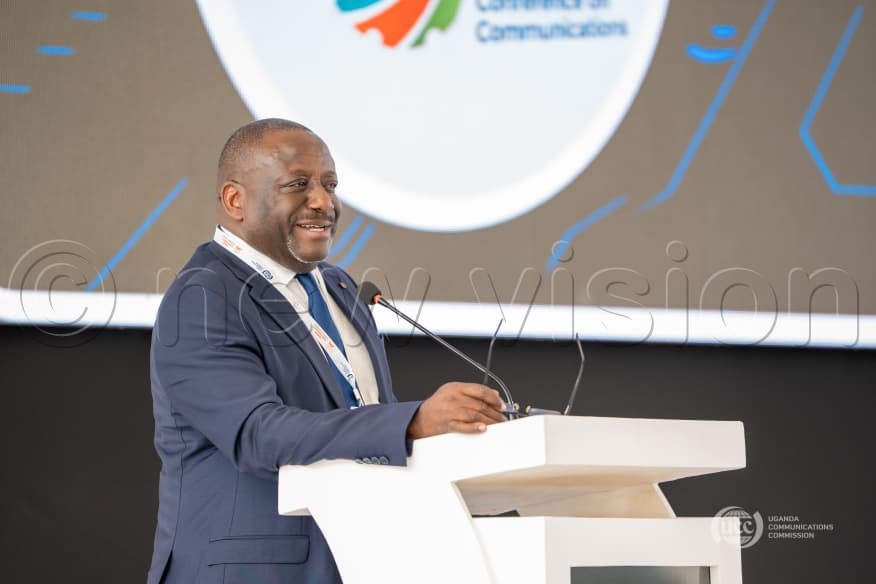Uganda must build its own Silicon Valley — UCC chief Nyombi Thembo
Uganda Communications Commission (UCC) executive director Nyombi Thembo said Uganda must adopt a co-ordinated national approach to technology and innovation, modelled on successful ecosystems such as Silicon Valley.
ICT Minister Dr. Chris Baryomunsi (centre) receives a bouquet of flowers from ISBAT University Chancellor Jachan Omach, as UCC Executive Director Nyombi Thembo (right) looks on. This was during the 9th National Conference on Communications (NCC), held at the National ICT Innovation Hub in Nakawa on Thursday. (Photos by John Masaba)
________________
There is an urgent need for stronger collaboration between academia, the private sector and the Government to unlock Uganda’s full digital innovation potential, New Vision Online has learnt.
Speaking at the 9th National Conference on Communications (NCC) held at the National ICT Innovation Hub in Nakawa on Thursday, October 2, 2025, Uganda Communications Commission (UCC) executive director Nyombi Thembo said Uganda must adopt a co-ordinated national approach to technology and innovation, modelled on successful ecosystems such as Silicon Valley.
“When you see UCC emphasising these collaborations between academia, industry and government, we are not reinventing the wheel,” he said.
“We are doing something that we know has worked for the best in the world.”
The event, presided over by the Minister of ICT and National Guidance, Dr Chris Baryomunsi, brought together leading stakeholders from across the ICT sector.
Drawing parallels with global innovation models, Thembo cited the roles played by Stanford University, HP (Hewlett-Packard), and US military institutions in developing technologies such as the internet and GPS.
“The Internet, which we are weaponising so much today, comes from strategic institutions like the Navy and the Army,” he said.
“It was commercialised by innovators in Silicon Valley, with academia providing the research base. You cannot say you’ll do it alone. It must be an ecosystem.”
Uganda Communications Commission (UCC) executive director Nyombi Thembo urged Ugandans to move beyond being passive consumers of foreign technologies and instead become active creators.
Thembo challenged universities and researchers to align their innovation efforts with real-world market needs, arguing that sustainable innovation must be both academically rigorous and commercially viable.
“Academia must understand that while we are very good at innovating, the private sector is always listening to the market,” he said.
“Whatever we do must have commercial value, and sustainable academic value will only come through that.”
He praised the presence of private sector players at the event, calling them vital partners in delivering solutions to the public.
“Through the private sector, we serve society,” he said.
“Some of us are convinced that the private sector can do miracles when paired with a resilient academia and sound policy from government.”
A strong advocate for local innovation, Thembo urged Ugandans to move beyond being passive consumers of foreign technologies and instead become active creators.
“We should not only be buyers of applications and innovations from outside. We must also be creators,” he stressed.
“Otherwise, ICTs might just enhance foreign exchange haemorrhage instead of growing our economy.”
Referring to the ongoing restriction of Facebook services in Uganda, Thembo said such gaps should be seen as opportunities for local entrepreneurs to innovate.
“If Facebook was so important, why haven’t our creators built something like it?” he asked. “Innovation is a function of necessity.”
Echoing similar sentiments, Jachan Omach, the chancellor of ISBAT University, called for an integrated innovation ecosystem to drive Uganda’s digital agenda.
“We are not reinventing the wheel,” Omach said.
“This is a model that has worked for the best in the world — from Silicon Valley to global tech hubs.”
He emphasised the importance of academic institutions working in sync with government and private enterprise, noting that “innovation is a result of ecosystem thinking, no one does it alone.”
Omach also reinforced the need to link research with real-world value.
“Academia must understand that at the end of the day, whatever we do must have commercial value,” he said. “Sustainable academic work must translate into marketable solutions.”
He lauded UCC and its partners for creating platforms like the NCC that enable meaningful dialogue and collaboration between sectors. “When combined with resilient academic institutions and the right policy environment, miracles can happen,” he said.
The 9th NCC, themed “Harnessing Digital Innovation to Power Sustainable Local Solutions for Uganda's Development Goals,” continues to grow as a leading platform for advancing research, innovation, and policy alignment in the ICT sector.
Thembo also highlighted key UCC initiatives aimed at enabling innovation and experimentation, including the National Communications Testament, regulatory sandboxes for testing emerging technologies, and the Research and Innovation Framework to support local talent.
“Digital innovation is not just about new technologies,” Thembo concluded.
“It’s about inclusive, sustainable solutions that improve livelihoods, strengthen service delivery, and drive Uganda’s competitiveness in the global digital economy.”